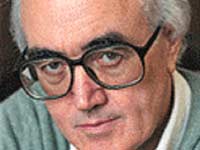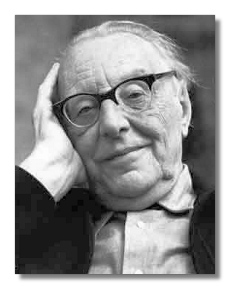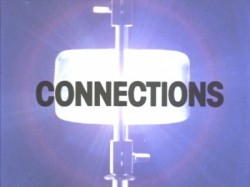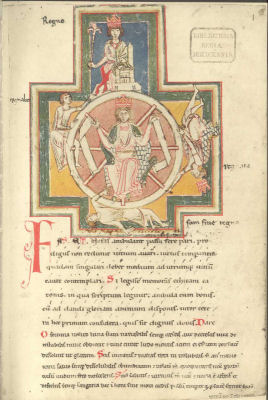I spent a lot of time last night looking at translations of Latin and Middle High German poetry. Oh, and listening to what I can only refer to as operatic renditions of the pieces.
 How did this happen? Well, actually, like many times when I start following a trail of weird connections, it all comes back to James Burke–usually just because I blame him for my pleasure in finding connections between apparently disparate things, but in this case much more explicitly about him.
How did this happen? Well, actually, like many times when I start following a trail of weird connections, it all comes back to James Burke–usually just because I blame him for my pleasure in finding connections between apparently disparate things, but in this case much more explicitly about him.
I’ve been a pretty big fan of Burke since the first time I watched the original Connections series back in the day
Since then I’ve read his books, watched his other shows, hell, I’ve even watched some of his old BBC work when he was science reporting–like covering the Apollo missions. (Although I admit, I probably haven’t paid enough attention to the Knowledge Web project–although those ‘mystery tours’ are pretty cool examples of the interconnectedness of history.)
Anyway, I’ve been rewatching Connections slowly for the last little while–I have this plan to ration episodes of the first series, then The Day The Universe Changed, and then the second and third series, over a few months–and a particular piece of music kept striking me. I recognized it, but only because I’ve always found it striking in previous passes through the series, not because I actually knew what it was. (Although, peeking ahead, it seems I would have recognized it for sure if I were a Patriots fan.)
For whatever reasons we decide these things, this time I decided to find out what the music was. I had planned to start with Wikipedia, to see if there was a link to any kind of detailed fan site, or somesuch, but it turned out I didn’t need to go any deeper than the introduction to the Connections page there.
The series is well-known for Burke’s impeccable narration (especially its dry humour), historical reenactments, intricate working models, skillful use of classical music (most notably Fortuna Imperatrix Mundi, or “O Fortuna” from Carmina Burana), and shots on location as far afield as Penang (Malaysia).
“Fortuna Imperatrix Mundi”? What’s that, “Fortune, Empress of the World” or something? I wonder if that’s it? And I wonder what a “Carmina Burana” could be.
Well, it turns out that was the music.
(I am left with the suspicion that Enya either is familiar with this work, or that they’re both influenced pretty heavily by an earlier tradition.)
That, of course, lead me to reading the lyrics (and translation–my Latin’s good enough to guess at the title, but not to read the text, for sure) for the piece. I was actually a bit disappointed to see that it’s essentially a complaint about how we are all slaves to chance, and how we should be worried when we’re doing well because that just means the hammer is about to come down. Pretty intense music, though.
 Apparently a German composer named Carl Orff took this medieaval poetry collection, the Carmina Burana, and set it to music–that piece is one of his arrangements. I would have guessed the arrangement was pretty old, but it actually dates from only the mid-30s.
Apparently a German composer named Carl Orff took this medieaval poetry collection, the Carmina Burana, and set it to music–that piece is one of his arrangements. I would have guessed the arrangement was pretty old, but it actually dates from only the mid-30s.
That, in turn, lead back to my interest in what this poetry collection was, and why it merited a name at all, etc.
I’ll spare you my rendition of the details of all of that, and just point you to the Wikipedia article.
Reading the information there got me interested enough to want to find out what the contents of the collection, besides “O Fortuna”, were. I found a site–part of a site designed to accompany a “teach yourself Latin” text, actually–that had translations of the selections from the collection that Orff had set to music. At some point I’d like to have a look at the entire set of surviving pieces
It’s fascinating stuff, and the degree to which it applies just as well now as it did then is actually a bit staggering. (Now that I think of it, I wonder what someone like Baba Brinkman could do with this material to put into a modern idiom–the content is certainly still relevant.) While I found most of the love poetry a bit boring–in exactly the same way I find most earnest love songs a bit boring–there’s certainly no question that the sentiments those pieces express are things we can relate to today.
I’m pretty sure that the spirit behind the drinking song IN TABERNA QUANDO SUMUS is one that both members of my university faculty, and members of the HGPA, could get behind. (Actually, I especially like the notion of the routine series of thirteen… well, twelve… toasts to various things.) Orff’s arrangement of it, though, is a little too German
The one that sticks with me, though, is “AESTUANS INTERIUS“
For instance, the post title above, which is translated as “I seek men like myself, and I am joined with rogues.” I like that, and could take it to a couple of different places. I think it’s meant in context to indicate the speaker’s assessment that his choices (or lack thereof) has lead him to become a rogue, but I could also see using that kind of notion, in a different piece, as a celebration–an “I’d rather laugh with the sinners than cry with the saints” thing, or perhaps even more pointedly a “dogs and sorcerers” thing.
I also like the notion that “neither chains nor key can hold me”, and I love the phrasing of “a serious heart is too serious a matter”–although again, I’d rather see the phase used in a light-hearted evasion of a serious discussion than in the context of self-flagellation for not being serious enough.
This version is one of the best I could find, both in the audio and in the accompanying video. This one is with Håkan Hagegård doing the vocals.
Here’s the pretty famous Jospeh Shore singing Orff’s arrangment in 1990:
Anyway, at the end of this I’m left with two things: a vague desire to track down the rest of the poems from the original collection, and a much more powerful desire to start tracing connections between the New England Patriots, the Apollo space program, Nazi germany, and wandering poets of the 12th century.




2 comments for “Quaero mihi similes, et adiungor pravis.”